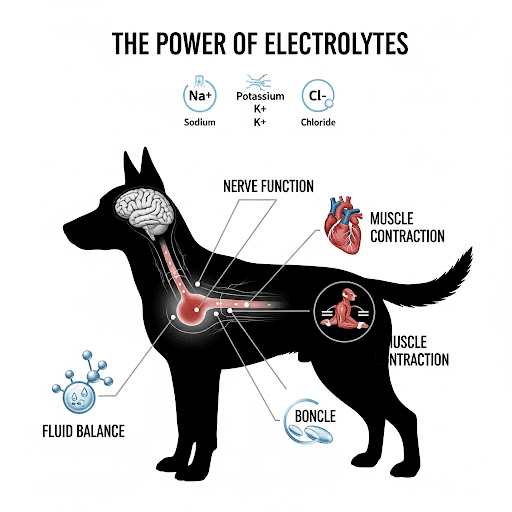We all know that fresh, clean water is the single most important nutrient for our pets. But water doesn't work alone. To properly hydrate every cell in your pet's body, it needs a team of powerful, charged minerals to direct it where to go. These essential minerals are called electrolytes.
You’ve likely heard the term "electrolytes" in commercials for human sports drinks, but what are they, and what role do they play in your pet's health? This article will break down the crucial role of electrolytes for pets, explaining what they are, why they are so critical for hydration, and when they might need special attention.
What Are Electrolytes and What Do They Do?
So, what are electrolytes? Simply put, they are essential minerals that carry a small electric charge when dissolved in fluid (like water). The three main electrolytes in your pet’s body are Sodium, Potassium, and Chloride.
Their primary and most important job is to maintain proper fluid balance. Think of them as the "Traffic Cops of Water." They direct water to move in and out of your pet's cells, ensuring that every tissue and organ stays correctly hydrated.
But their role doesn't stop there. The electrical charge they carry is also critical for:
- Nerve Function: Transmitting signals from the brain to the rest of the body.
- Muscle Contraction: Allowing muscles to tighten and relax—a process that includes the steady beating of the heart.
- Maintaining pH Balance: Keeping the body's acid-base balance within a tight, healthy range.
Proper hydration for dogs and cats is impossible without the correct balance of these hardworking minerals.
The Dangers of Dehydration and Electrolyte Imbalance
A healthy pet maintains a perfect electrolyte balance through the food they eat and the water they drink. However, this delicate balance can be disrupted when fluids are lost rapidly.
The most common cause of a serious electrolyte imbalance is significant fluid loss from vomiting or diarrhea. When a pet is sick, they don't just lose water; they lose large amounts of sodium, potassium, and chloride along with it. Strenuous exercise, especially in hot weather, can also lead to losses.
The signs of dehydration in cats and dogs—such as lethargy, sunken eyes, dry gums, and loss of skin elasticity—are also signs of an electrolyte imbalance. This can quickly lead to weakness, muscle cramping, and in severe cases, can become life-threatening.
A complete and balanced diet is the first line of defense. Every recipe recommended by our meal planner is formulated with the correct balance of sodium, potassium, and chloride to meet your healthy pet's daily needs. This ensures that for everyday life, their hydration and electrolyte levels are perfectly supported through their food.
When Are Electrolyte Supplements Necessary?
This brings us to a critical question many owners ask: does my pet need an electrolyte supplement?
For a healthy pet who is eating a complete and balanced diet and drinking plenty of water, the answer is a firm no. Their daily food provides all the electrolytes they need.
A special note: Do not give your pet human sports drinks like Gatorade or Powerade. These drinks are formulated for humans and are dangerously high in sugar, which can actually worsen diarrhea in a sick pet. Furthermore, some may contain artificial sweeteners like xylitol, which is highly toxic to dogs.
Electrolyte supplementation is only necessary in specific situations and should always be guided by a veterinarian.
- After Illness: A vet may recommend a specially formulated veterinary electrolyte solution to help a pet rehydrate safely after a severe bout of vomiting or diarrhea.
- For Canine Athletes: Dogs participating in very strenuous, long-duration events (like sled dog racing or field trials) may benefit from a canine-specific electrolyte supplement designed for their unique needs.
Never give your pet an electrolyte supplement without veterinary guidance. Providing the wrong balance can do more harm than good.
(Dehydration is a serious concern. Learn to spot the signs in our article [Dehydration in Pets: The Silent Signs to Watch For].)

Conclusion: The Spark Plugs of Hydration
Electrolytes are the essential, charged minerals that act as the spark plugs for proper hydration. They manage your pet’s fluid balance, enable nerve signals to fire, and allow muscles to contract. They are the indispensable partners that make water work effectively within the body.
For daily life, you can trust that a high-quality, complete and balanced diet will provide the electrolytes your pet needs. The most important thing you can do is ensure they always have a bowl of fresh, clean water available.
If you ever suspect your pet is dehydrated from illness or heat exposure, contact your veterinarian immediately. They are the only ones who can safely assess your pet's condition and determine if electrolyte support is needed. For everyday wellness, use our meal planner to ensure your pet's diet provides the foundational minerals for a healthy, well-hydrated life.


